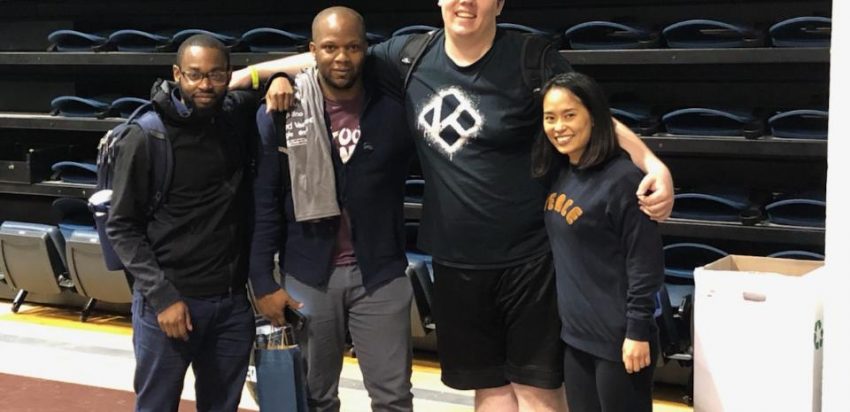Meet The Penn LPS Coding Boot Camp TAs Who Won a 24-Hour Hackathon

We share stories every day about the amazing participants who move through the program and enter the workforce. But what about the TAs who coach students through the programs?
Working with the Penn LPS Coding Boot Camp helped prepare Anh Lu, Isaiah Harrison, and Mitch Philmore to code their way to victory at the 2019 Philly Codefest, Philadelphia’s premiere social good-themed hackathon. Their project, the Dynamic Access System for Healthcare, is a web and mobile application that earned them a $2,500 prize.
Anh and Mitchell were TAs in the October 2018 cohort, and Isaiah will be joining the Penn Coding Boot Camp as a TA later this year. Below, they talk about their experience creating change-focused technology at the hackathon.
How did you first meet and form your team for the hackathon?
AL: We all met through the October 2018 session of the program and became close over time based on our shared passion for coding. One Saturday in class, I heard Mitch and Isaiah talking about the hackathon and knew I wanted to be a part of it.
IH: Our team’s fourth member is a good friend of mine who’s currently a student at Drexel University in Philadelphia. The two of us did the hackathon last year with a different team and found that we were the only ones who completed our sections, so we wanted to recruit a strong team. When Anh approached us about joining, I knew we had a winning group.
Can you describe the project and how you came up with it?
AL: The theme of the Philly Codefest 2019 was aimed at generating real-world, scalable solutions to help end economic inequality in Philadelphia. Our project is called the Dynamic Access System for Healthcare (2E). It’s a real-time system for quick access to medical records for individuals with little or no access to healthcare and for individuals with medical emergencies.
IH: If you don’t have health insurance, it’s nearly impossible for medical professionals to track your history. We came up with the idea to solve this issue by providing the less fortunate a platform that houses information while protecting their privacy under HIPAA standards. A hospital simply has to scan a QR code to access records.
MH: Another unique feature we thought of is an emergency override function. This way, if someone is in extreme distress or unconscious, doctors are able to access their records anyway.
How did you approach the hackathon and map out a winning strategy?
AL: First, we really dove into the research and regulations with healthcare information. Our team created a way to encrypt the data to provide extra security, and we created a framework of what information would actually need to be included for the patients.
MP: We separated out the team to play to individual strengths since we were working within such time constraints. Isaiah built the front end in React, and Anh and I developed the back-end framework using Express.js and MongoDB. Our fourth member worked in Python to generate mock data.
IH: The hackathon was 24 hours straight—imagine staying up and coding for that long! We had big plans that had to be scaled down in order to achieve a finished product. Most of the night was spent planning and stringing together individual parts. It was only in the last four hours that we started stringing code together to form the app.
At certain points, we weren’t confident that we would complete our project in time. Most teams don’t actually finish their projects and end up having to explain how they function.
We really do owe much of our success to the extra technologies we knew from working with the boot camp. We’re used to working under pressure and using these technologies daily, so we were able to go the extra step and present a working app in just one day as a result.
What’s next after winning?
MP: Without revealing too much, we are actually working to make our project into a legitimate company. We’re changing our business plan slightly but really hope to make a difference with this technology.
What advice do you have for someone who’s thinking about doing a hackathon?
AL: Take a nap! It seems counterintuitive to take breaks. Even when you know what you’re doing, it’s so hard with no sleep.
On a more general note when learning to code, I always tell my students don’t ever give up. We all started from scratch at one point—everyone learns at different speeds, and that’s okay.
MP: Even now, I have situations where I want to learn and things don’t click and I get frustrated. When you’re learning, you’re going to feel uncomfortable, so learn to embrace being uncomfortable.

 Live Chat
Live Chat